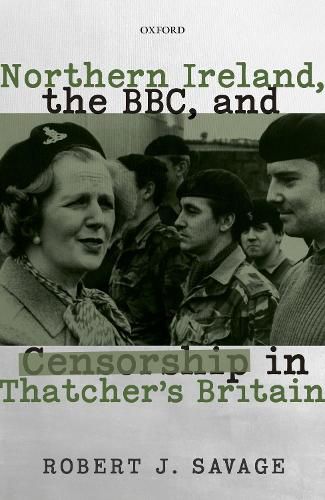Readings Newsletter
Become a Readings Member to make your shopping experience even easier.
Sign in or sign up for free!
You’re not far away from qualifying for FREE standard shipping within Australia
You’ve qualified for FREE standard shipping within Australia
The cart is loading…






This is a study of how the Northern Ireland conflict was presented to an increasingly global audience during the premiership of Britain’s ‘Iron Lady’, Margaret Thatcher. It addresses the tensions that characterized the relationship between the broadcast media and the Thatcher Government throughout the 1980s. Robert J. Savage explores how that tension worked its way into decisions made by managers, editors, and reporters addressing a conflict that seemed insoluble. Margaret Thatcher mistrusted the broadcast media, especially the BBC, believing it had a left-wing bias that was hostile to her interests and policies. This was especially true of the broadcast media’s reporting about Northern Ireland. She regarded investigative reporting that explored the roots of republican violence in the region or coverage critical of her government’s initiatives as undermining the rule of law, and thereby providing terrorists with what she termed the ‘oxygen of publicity’. She followed in the footsteps of the Labour Government that proceeded her by threatening and bullying both the BBC and IBA, promising that the draconian Prevention of Terrorism Act would be deployed to punish journalists that came into contact with the IRA. Although both networks continued to offer compelling news and current affairs programming, the tactics of her government produced considerable success. Wary of direct government intervention, both networks encouraged a remarkable degree of self-censorship when addressing ‘the Troubles’. Regardless, by 1988, the Thatcher Government, unhappy with criticism of its policies, took the extraordinary step of imposing formal censorship on the British broadcast media. The infamous ‘broadcasting ban’ lasted six years, successfully silencing the voices of Irish republicans while tarnishing the reputation of the United Kingdom as a leading global democracy.
$9.00 standard shipping within Australia
FREE standard shipping within Australia for orders over $100.00
Express & International shipping calculated at checkout
This is a study of how the Northern Ireland conflict was presented to an increasingly global audience during the premiership of Britain’s ‘Iron Lady’, Margaret Thatcher. It addresses the tensions that characterized the relationship between the broadcast media and the Thatcher Government throughout the 1980s. Robert J. Savage explores how that tension worked its way into decisions made by managers, editors, and reporters addressing a conflict that seemed insoluble. Margaret Thatcher mistrusted the broadcast media, especially the BBC, believing it had a left-wing bias that was hostile to her interests and policies. This was especially true of the broadcast media’s reporting about Northern Ireland. She regarded investigative reporting that explored the roots of republican violence in the region or coverage critical of her government’s initiatives as undermining the rule of law, and thereby providing terrorists with what she termed the ‘oxygen of publicity’. She followed in the footsteps of the Labour Government that proceeded her by threatening and bullying both the BBC and IBA, promising that the draconian Prevention of Terrorism Act would be deployed to punish journalists that came into contact with the IRA. Although both networks continued to offer compelling news and current affairs programming, the tactics of her government produced considerable success. Wary of direct government intervention, both networks encouraged a remarkable degree of self-censorship when addressing ‘the Troubles’. Regardless, by 1988, the Thatcher Government, unhappy with criticism of its policies, took the extraordinary step of imposing formal censorship on the British broadcast media. The infamous ‘broadcasting ban’ lasted six years, successfully silencing the voices of Irish republicans while tarnishing the reputation of the United Kingdom as a leading global democracy.